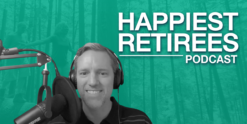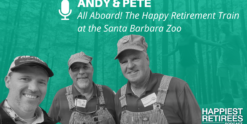What do the happy retirees (HROBs) know that the unhappy ones (UROBs) don’t? It isn’t just one thing. It’s a list of financial, social, health, and even family habits that are all ingredients in the recipe.
It took twelve years of hosting the Money Matters radio show and the better part of a decade studying HROBs, conducting countless research surveys, analyzing data, and now creating the Retire Sooner podcast for me to harness the tools necessary to convert a blueprint into a treasure map. I’ve compiled all of it into my new book: What the Happiest Retirees Know: 10 Habits For Healthy, Secure, and Joyful Life.
It has become my calling to find the best way for retirees, and humans in general, to find happiness. Why? It goes back to when I was a kid, living in a very dichotomous part of the country: Coatesville, Pennsylvania. To give you a sense of the area, parts of the HBO show Mare of Easttown were filmed there. To call it drab would be an understatement—big steel factories, smokestacks, rust, and chain-link fences. But go less than a mile from the center of town and you’re surrounded by some of the most beautiful landscapes in the United States. There are rolling hills, miles and miles of open horse fields, pastures, and roaming cattle. Also nearby is Amish country—Lancaster. If you’ve seen the movie Witness, starring Harrison Ford and Kelly McGillis, you’ve seen the area. It was filmed in some of the same Amish dairy farms my dad took me to during his days as a large animal veterinarian.
This world of extremes—from the lower-middle class rust belt to the quaint simplicity of the Amish to the opulence of $50 million horse farms—was confusing in my youth. I assumed, as most do, that it was better to be wealthy than not but the older I got the more apparent it became that the rich folks were often not any happier than the Amish or the factory workers. I became preoccupied with the question of whether more wealth led to more satisfaction.
As a grownup working in the world of investment planning, helping people work towards financial freedom, I was able to turn this obsession into practical data points. What I’ve found is that money can indeed buy happiness, but the price is lower than you might think.
With this realization, I set out to find the people who knew how to weather tumultuous financial times and find happiness so that I could reverse engineer their process and share it with others.
Having access to thousands of sample sets, finding the families who were in the right situations, and being able to ask them in-depth questions about their financial and life habits is perhaps easier today than it’s ever been. My team and I took it all in and distilled it down to make sense of it.
There are 30 things you can do and 30 things you can avoid to increase your chances of a happy retirement. The book wrangles all of this into 10 categories, and I want to highlight each one for you here so that you can discover how to live a healthy, secure, and joyful life.
Net Worth
Let’s start with money. How much is enough? It depends if you look at the median or the mean. As we remember from arithmetic, the median is the middle number within a set, whereas the mean is what we typically think of as “the average.”
According to my research, the median inflection point between happiness and unhappiness in retirement is $500K in liquid net worth. (In other words, this is money that you can get to.) Based on research, that is the minimum amount to reach for happiness. I’ve been chided by people who think that’s not enough as well as by those who say it’s unfair to expect so much. Maybe both sides are right, but that’s what my research clearly shows, and I’ve seen it work in real life with my clients so many times.
Now, many of the clients I surveyed are extremely wealthy and that skews the average (mean) up to $900,000. I think both numbers are important to remember as long as we keep them within that context.
Yes, more is better for financial comfort, but our data made it very clear that there is a plateau effect. So, while there is a big gain in happiness when folks leap $100,000 to $250,000 or from $250,000 to $500,000 there is a lot less incremental gain when we go from $2 million to $4 million. Thus, getting to a specific monetary amount is a really important concept and the magic number is $500,000 “in the bank.”
Also important is having the mortgage close to, if not fully, paid off, and possessing multiple streams of income.
Spending
It doesn’t matter how much you have saved if the outflow is excessive. You could have $5 million in the bank but if your yearly nut is $2 million, you’re in big trouble.
Happy retirees understand the 4% Plus Rule. It’s a well-respected and crucial theory created by an MIT graduate named William Bengen that sought to figure out the highest percentage of money that could be taken out of a retirement nest egg without the risk of running out.
Bengen discovered that the vast majority of the time, people could withdraw just above 4% per year, adjusted for inflation and assuming at least 50% in stocks, and not run out of money throughout the course of a 30-year retirement. Recently, Bengen has adjusted that number to about 4.5%, which is why we call it the 4% Plus Rule.
Understanding this can provide Americans with the peace of mind it takes to enjoy retirement.
Investing
HROBs are tomorrow investors. They’re not worried about today. They’re not even necessarily worried about any given year. They’re thinking about the future.
If you’re investing in the US economy, where we live amongst an army of American productivity that can be relied upon to continue thriving throughout our lives, a person can safely assume that tomorrow’s investment results will be either good, great, or some combination of the two. That’s the optimism I have and HROBs seem to have it as well.
The happy retirees often invest in stock dividends. It’s not the only approach, but they understand that it offers a relatively steady stream of income that creates a paycheck for their retirement, especially with the history and probable future of low-interest rates.
It’s a very powerful notion that, collectively, we’ve seen companies in the S&P 500 (and beyond) able to consistently raise what they pay out year after year. It’s not a straight line and every decision carries some degree of risk but with the elasticity of value from good times to bad, many retirees seem to find happiness in the calm but lucrative approach of dividends. Loss aversion is a human instinct that can lead to unhappiness and HROBs do their best to avoid it.
Curiosity
Curiosity may have killed the cat, but a lack of curiosity kills happiness in retirement. HROBs find core pursuits—hobbies on steroids—and extract joy from their passion for commitment and improvement. It’s something a retiree lives for and can’t wait to do on a consistent basis.
The type of activity is less important than the yearning to perform it.
For instance, it’s hard to drag my dad onto the golf course. He has no eagerness to lower that handicap or try out the new Five Iron. Even if I did ever get him to join me on the links, he’d probably sneak into the bar before we hit the back nine. In contrast, he has about 15 activities that he can’t wait to repeat early and often. From riding horses to gardening to strumming his guitar, these core pursuits have kept him interested, stimulated, and happy since his retirement a year and a half ago.
A core pursuit isn’t a hobby. I recently found myself on a hike when the family took a vacation. It was fine. I didn’t hate it, but I didn’t love it. I’ll do it once in a while when the situation presents itself but don’t actively search for opportunities. Hiking is not a core pursuit for me. I do love golf. It’s a part of my life. I play as much as I can as a father of four boys who still works full time. Once I retire, it will be hard to keep me off the course.
Curiosity is the cousin of purpose. HROBs want to find out more and become better at their chosen quest. A core pursuit is a momentum generator. It begets activity which begets stimulation which begets learning, accomplishment, and ultimately happiness.
On average, happy retirees have at least 3.6 core pursuits while the unhappy ones have less than 2. They know that life doesn’t stop just because work does. In many cases, that’s when life finally begins!
Faith
I won’t be knocking on your door trying to save you from eternal damnation, but my research does show that HROBs have a propensity to belong to a church. Statistically, they attend at least twice a year. I guess that’s why it’s harder to find a seat on Christmas and Easter.
Churches are a great resource for those yearning for connection and charity, and happy retirees are the type who enjoy helping and giving to others. I’m not saying you have to go to church to be a happy retiree, but I did ask the question in my surveys and it was interesting to see that folks were 1.5 times more likely to fall into the HROB camp if they attended once per week. In full disclosure, my pastor tells me anecdotally that the figure is probably closer to 1.7 times per month, but don’t tell anyone.
I don’t know how much this has to do with faith and I’m not here to debate that aspect. What I do know is that a place of worship is a powerful place to build a community.
Social
A close connection is someone you confide in for any number of the experiences we go through as humans. Maybe you had a great day, maybe you had a terrible day, maybe you did something embarrassing that made you laugh. No matter what it is, you can share it with this person.
Acquaintances are fine but what we’re looking for is something more—someone who celebrates your good days and comforts you when times are tough. Even for those with a large friend group, this type of confidant is valuable, rare, and essential. Statistics show that HROBs have 3.6, while UROBs only have 2.6.
It could be a sibling or just a really good friend. These people are essential to your happiness. Interestingly, unlike with money, there is no plateau effect when it comes to the relationship between happiness and close connections—the more the merrier.
Health
I’m not a health expert, and I have no recommended diet for you. That said, I did put the question to happy retirees and found a skew towards the Mediterranean Diet. I won’t put much energy into whether or not that’s the best regimen because what seemed more important than the type of diet was the mindset of needing to have a nutritional game plan. Happy retirees possess that type of intentionality. They care about what they put in their bodies.
Good health is a prerequisite for participation in all of the other parts of the HROB equation. Not all core pursuits include physical activity or exercise, but many of the top ones do. I refer to them as the “ings”—walking, running, biking, hiking, jogging, swimming, dancing, etc. These all involve some sort of motion and exercise. Yoga doesn’t have an “ing” but that certainly counts. I know a couple who does it together and it’s a huge source of happiness.
You can’t speak about health and diet without at least mentioning alcohol consumption. I found no relation between that and happiness. Some happy retirees drink and some don’t. Get your swerve on or don’t, it’s all good. I will say that many happy retirees reported enjoying white wine and gin, so if you do imbibe, consider those as options.
Love
So many of the “love” habits of happy retirees center around marriage. The life cycles of marriage allow for ample introspection. What does marriage look like in the first 5 to 7 or 7 to 10 to or 10 to 20 years? You go from the honeymoon phase to the sticker shock of having and paying for kids. Then the kids go to college and leave the nest and it’s a readjustment getting back to the one-on-one intimacy you started with. Then comes retirement. Do you have enough money to stop working?
Financial problems rank in the top five causes for divorce, coming only behind giant issues such as infidelity and lack of respect. However, just as I’m not a health expert, I’m also not a marriage counselor. Just ask my wife. But I do want to point out some of the things I’ve learned.
Unmarried folks are 4 and a half times more likely to land in the unhappy group. That tidbit hits loud and clear. It’s definitely possible to be a single and happy retiree, but only with the support of social connections. I personally recommend you get out there and see if there isn’t a match waiting in the wings.
All that said, divorce isn’t necessarily a dealbreaker. My data show that people get one marriage mulligan without losing levels of happiness. However, by the time marriage number three rolls around those happiness levels do drop. And the descent continues with marriage number four. I can’t tell you why Hugh Hefner, married 3 times, always looked so happy but I can say he was the exception to the rule.
Home
As the years until the mortgage is paid off tick down, happiness levels tick up. In fact, those within 5 years of repayment are 4 times more likely to be happy. Being able to see the light at the end of the tunnel is a huge weight lifted off the shoulders of retirees. It’s easy to see how that would ease anxiety and make space for more happiness.
From a housing cost perspective, HROBs live in nice houses, but not necessarily McMansions. As of 2021, the average price of an HROB home was just under the $600,000 range. That’s a lot of money, but not in today’s inflated housing market.
Family
This is one of my favorite categories. What I found is that even though, as parents, we all want our kids to be independent, the dynamic evolves as kids go from babies to toddlers to tweens to teens to adults. My dream is that one day my children will be able to support themselves. It will be sad to see them leave, but it’s ultimately what’s best for everyone. They need to be on their own and my wife and I will need to focus on our retirement. Therefore, it wasn’t surprising to find out that UROBs spend more money per month on their adult children than HROBs—$700 vs $500. If it exceeds $2000/month you’re 4 times more likely to be an unhappy retiree.
There’s a difference between treating the grandkids to Disneyland and taking over the cost of their entire private school education. Happy retirees know the importance of setting boundaries when juggling the expenses of their own retirement.
While we don’t want to support our kids financially or have our adult children live with us, we do want them nearby. It’s vital to live near at least 25% of your kids, but increasing that to 50% or more is even better for happiness. Same house? No. Same neighborhood, town, state? All excellent.
Conclusion
Because financial planning has so much grey area and room for different strategies, I like to use my research as a set of tiebreakers that can help us make life, social, health, and financial decisions based on more than just money. And that’s why I’ve spent so much time and effort over the years learning from HROBs. They are proof it can be done and the more we emulate them, the better off we’ll be.
There isn’t a perfect formula for the happy retiree, but there are 30 different traits that really do move the needle. While few happy retirees nail every trait, they do get a lot of them right. So can you.
Get the full story in my new book, What the Happiest Retirees Know: 10 Habits For Healthy, Secure, and Joyful Life. Available now.
This information is provided to you as a resource for informational purposes only and should not be viewed as investment advice or recommendations. Investing involves risk, including the possible loss of principal. There is no guarantee offered that investment return, yield, or performance will be achieved. There will be periods of performance fluctuations, including periods of negative returns. Past performance is not indicative of future results when considering any investment vehicle. This information is being presented without consideration of the investment objectives, risk tolerance, or financial circumstances of any specific investor and might not be suitable for all investors. This information is not intended to, and should not, form a primary basis for any investment decision that you may make. Always consult your own legal, tax, or investment advisor before making any investment/tax/estate/













